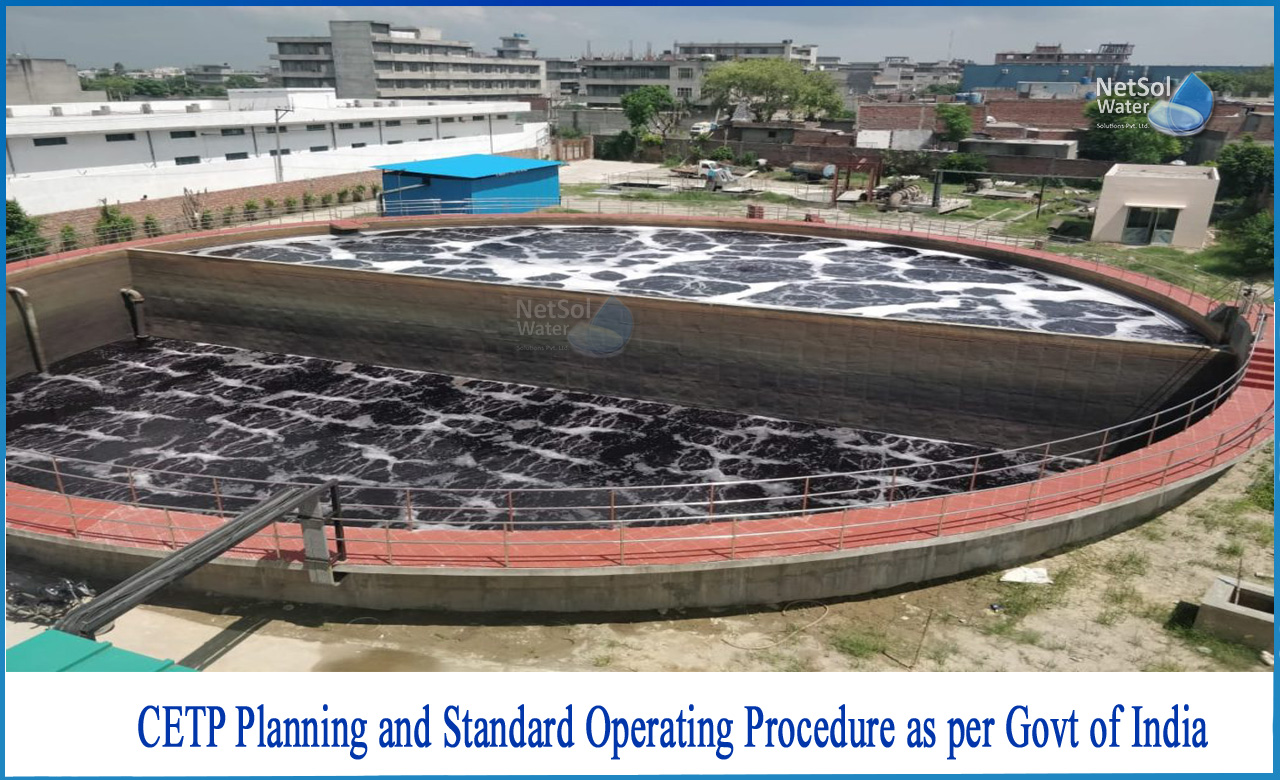Planning a Common Effluent Treatment Plant (CETPs)
The establishment of a Common Effluent Treatment Plant (CETP) necessitates careful preparation. The figure below depicts the procedures involved in planning of CETPs.
Following are some of the factors that influence the proper planning and operation of CETPs:
i) Types of member industries that generate effluent;
ii) Fluctuations in effluent quality/quantity (equalization/homogenization);
iii) Pre-treatment requirements;
iv) Effluent stream segregation at individual member industries;
v) Mechanism for data collection and monitoring;
vi) Treatability, technology selection, biodegradability, and interferences;
vii) Disposal method; and
viii) Charge system.
What are the Standard Operating procedures for CETP?
The Ministry has launched a Centrally Sponsored Scheme to assist Small Scale Industries (SSI) in establishing Common Effluent Treatment Plants (CETPs) across the country and installing pollution control equipment’s for effluent treatment.
The following are the conditions for financial help considerations:
1: CETPs should be located in industrial parks or in groups of Small Scale Industrial Units;
2: Only clusters of SSIs will be eligible for central assistance;
3: Assistance projects will be prioritized based on the toxicity of pollutants, the amount of pollution generated and treated, and the number of units covered;
4: The State Industrial Infrastructure Corporations or an appropriate institution, including a cooperative organization of the affected units, as determined by the State Governments/SPCBs concerned, will set up and manage the CETPs;
5: For loan repayment and operation and maintenance costs, the project should be self-sustaining.The project must develop appropriate institutional mechanisms for cost sharing, collection of dues, and management, as well as guarantee that set standards are followed;
6: State Pollution Control Boards must give their technical approval to the programme.The conveyance system from the individual units to the CETP should be included in the CETP project;
7: The CETP's primary and secondary treatment sludge characteristics (i.e. hazardous vs. non-hazardous) should be estimated. As a result, the CETP should include a sludge management strategy that is established based on sludge characterization and recorded in the CETP project feasibility study;
8: The possibility of member units recycling or reusing the treated effluent from the CETPs should be investigated and reported in the CETP project's feasibility report;
9: An environmental management and monitoring plan/programme (EMP) for the CETP must be developed and documented in the CETP project's feasibility study;
10: A formal agreement between the CETP Co. and its member units must be included in the CETP project's feasibility report;
11: All members should agree to the CETP project's cost recovery mechanism, which should be stated in the CETP project's feasibility study;
12: The necessary clearance from the concerned State Pollution Control Board for discharging the treated effluent must be obtained and indicated in the CETP project's feasibility report;
13: All hazardous waste facilities linked with these CETPs should be approved by the State Pollution Control Board and included in the CETP project's feasibility report;
14: If the CETP Company does not want to take out loans from financial institutions or banks, then they may supplement it with their own resources/contributions, i.e. the entrepreneurs would contribute 50% of the project cost;
15: A grant of up to 25% of the total cost of the CETP would be paid by the federal government to the Common Effluent Treatment Plant(s) on the condition that the state government sanctions and release a matching grant. The CETP Company should cover the remaining costs through a combination of industry stock and financial institution loans;
16: Only capital costs will be covered by central aid. For ongoing charges, no assistance will be provided. The funds will be distributed in four equal instalments;
17: When a body has been identified for the purpose of implementing the project, financial arrangements have been finalized, institutional arrangements have been finalized, consent has been obtained from the State Pollution Control Board, and the State Government has committed its contribution, the first instalment of 25% of the assistance will be released;
18: Combining some CETP components with the municipal system may be advantageous. Municipalities must contribute their fair share to such programs;
19: The current physical and financial condition of the CETPs can be assessed. Funds issued for CETPs should only be used for CETPs and should not be used to pay off debts, bank loans, or other obligations;
20: Other than 17 types of extremely contaminated industries, large and medium-scale enterprises may join the CETP after primary treatment or as the State Pollution Control Board deems required for hydraulic load and CETP techno economic feasibility. Before the wastewater is discharged, the 17 kinds of enterprises must provide their own full-fledged effluent treatment facilities to ensure that it meets the necessary criteria. Large and medium-sized businesses, on the other hand, would not be eligible for any SSI subsidies.
What do we have to offer?
India is a developing country. With increasing population and decreasing water resources, we need to utilize our fresh water resources efficiently. It has become important to treat wastewater from industries, residences and commercial areas, to re-use that water for different purposes.
By contacting Netsol Water, you can have an expert solution, as we are the leading manufacturers of Industrial and Commercial Water Treatment Plants and Wastewater treatment plants, among other services. Our treatment systems are very efficient and effective at removing all types of chemical, physical, and biological pollutants and treating wastewater by using cutting-edge technologies.
Netsol Water is Greater Noida-based leading water & wastewater treatment plant manufacturer. We are industry's most demanding company based on client review and work quality. We are known as best commercial RO plant manufacturers, industrial RO plant manufacturer, sewage treatment plant manufacturer, Water Softener Plant Manufacturers and effluent treatment plant manufacturers. Apart from this 24x7 customer support is our USP. Call on +91-9650608473, or write us at enquiry@netsolwater.com for any support, inquiry or product-purchase related query.



